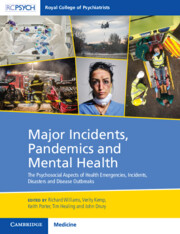 Major Incidents, Pandemics and Mental Health
Major Incidents, Pandemics and Mental Health from Section 1 - The Nature and Impacts of Twenty-First-Century Healthcare Emergencies
Published online by Cambridge University Press: 11 January 2024
Most disaster research, resources, and interventions for mental health have been based on the premise of a single incident or disaster occurring. This chapter presents the results of a scoping review on mental health in the aftermath of multiple disaster exposures. It draws on existing evidence from cases in which communities have experienced disasters in rapid succession or years apart. It focuses on groups of findings on cumulative effects, re-activation of post-traumatic stress disorder (PTSD), and links between mental and physical health. This chapter makes the case that multiple disaster exposures have different implications to exposure to a single disaster, and should be treated as a priority emerging public health issue, given the projected increases in the frequency and severity of disasters due to climate change.
To save this book to your Kindle, first ensure [email protected] is added to your Approved Personal Document E-mail List under your Personal Document Settings on the Manage Your Content and Devices page of your Amazon account. Then enter the ‘name’ part of your Kindle email address below. Find out more about saving to your Kindle.
Note you can select to save to either the @free.kindle.com or @kindle.com variations. ‘@free.kindle.com’ emails are free but can only be saved to your device when it is connected to wi-fi. ‘@kindle.com’ emails can be delivered even when you are not connected to wi-fi, but note that service fees apply.
Find out more about the Kindle Personal Document Service.
To save content items to your account, please confirm that you agree to abide by our usage policies. If this is the first time you use this feature, you will be asked to authorise Cambridge Core to connect with your account. Find out more about saving content to Dropbox.
To save content items to your account, please confirm that you agree to abide by our usage policies. If this is the first time you use this feature, you will be asked to authorise Cambridge Core to connect with your account. Find out more about saving content to Google Drive.